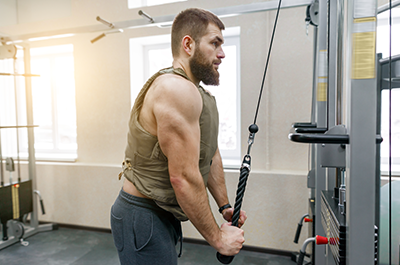Are you anxious to get your lawn ready to welcome family and friends for outdoor gatherings? Before you start mowing, make safety a top priority. Many push, self-propelled and riding mowers have built-in safety features. But serious injuries can still occur.
“Your lawnmower can help you create a perfectly manicured lawn. But it’s also a dangerous machine if misused. And injuries can happen in an instant. That’s why it’s important to take safety precautions before, during and after you mow,” says Ryan Desgrange, PA-C, a physician assistant in orthopedic surgery at Henry Ford Health.
Understanding Your Risk For Lawnmower Injuries
Lawnmowers pose significant health risks: In 2019, more than 77,000 people in the U.S. went to emergency rooms with lawnmower injuries. And children are 6 times more likely than adults to be injured by lawnmowers.
Lawnmower injuries vary in severity and can include:
- Burns from touching hot parts of the mower
- Broken bones from falls while using a mower
- Cuts or eye injuries from flying rocks, sticks or debris in the yard
- Severed fingers, toes or limbs from lawnmower blades
Avoiding Lawnmower Injuries
You can take steps to ensure that you’re using your lawnmower safely, avoiding injuries for yourself and others. Here, Desgrange outlines precautions for before, during and after mowing.
Lawnmower Safety: Before You Mow
Before you start mowing, take steps to avoid mower malfunctions and injuries:
- Review the operator’s manual. Read all operating instructions and safety tips. Even if you’ve owned your mower for several years, it’s helpful to review its features annually.
- Check all lawnmower parts. Clean the lawnmower and ensure all components work properly while the mower is off. Have questions? Check with lawncare retailers for assistance in maintaining your mower.
- Clear the yard. Before mowing your lawn, clear away all debris. Rocks and sticks can get caught in mower blades and cause eye injuries or cuts.
- Dress for success. Wear goggles or sunglasses to protect your eyes from flying yard debris and sun. Choose sturdy, nonskid, closed-toed shoes. (Flip-flops can get caught in mower blades or cause you to slip while mowing.) Long pants and gloves protect you from flying sticks, thorny bushes, hot oil or gasoline. And don’t forget a hat and sunscreen.
- Inspect the battery. Replace cracked batteries in electric mowers to avoid burns or electrical shocks. Only use the charger that came with the mower.
- Safety mechanisms. Ensure that all safety mechanisms are working correctly. Never disable safety mechanisms, such as the lever that stops the mower if you let go of the handle.
- Start fresh. Begin the season by adding new gasoline to your mower. Gas left over from the previous year may cause the engine to malfunction, making it difficult to start or run the mower.
Lawnmower Safety: As You Mow
As you get ready to mow, take these safety precautions:
- Avoid steep slopes. Mowers can tip on a steep slope. Mow horizontally across any hilly areas.
- Be aware of your surroundings. Don’t talk on the phone or use headphones while mowing. You may miss the sound of a person or animal approaching while you’re cutting the lawn.
- Keep young children and pets inside. Keep your children and pets inside while mowing. Do not let young children sit on your lap while using a riding mower.
- Mow with caution. Mow in a forward direction and be cautious when turning. Mowing in reverse can cause the mower to suddenly lurch or tip. Many riding and self-propelled mowers can move quickly, so monitor your speed to avoid injury.
- Pace yourself. Take breaks to avoid overexertion, especially on hot days. If you have a large lawn, mow it in shorter sessions. Make sure to stay hydrated.
- Supervise helpers. The American Academy of Pediatrics recommends that children be at least 12 years old to use a push-behind mower and 16 years old to use a riding mower. Ensure that your child has the maturity and coordination to learn to mow.
- Watch the weather. Check the forecast and mow only in dry conditions.
Lawnmower Safety: After You Mow
Take these steps once you’ve finished mowing:
- Clean the mower after use. Turn off the mower before cleaning away debris. Remove debris from mower blades using a long pole or tool rather than your hand or foot.
- Safe storage. Keep the mower in a dry place away from children and pets. Don’t allow children to sit on or play near mowers when not in use.
“Be cautious and mindful while doing lawn care chores,” says Desgrange. “Take the opportunity to teach your children about the importance of safety precautions when operating machinery or appliances at home.”
Subscribe today to receive weekly emails of our latest tips.
To find a doctor at Henry Ford, visit henryford.com or call 1-800-436-7936.
Ryan Desgrange, MS, PA-C, is the director of advanced practice providers for orthopedics at Henry Ford Health and specializes in bone health and fracture prevention, as well as care for broken bones and trauma. He sees patients at several locations across southeast Michigan and is available for scheduled video visits.



